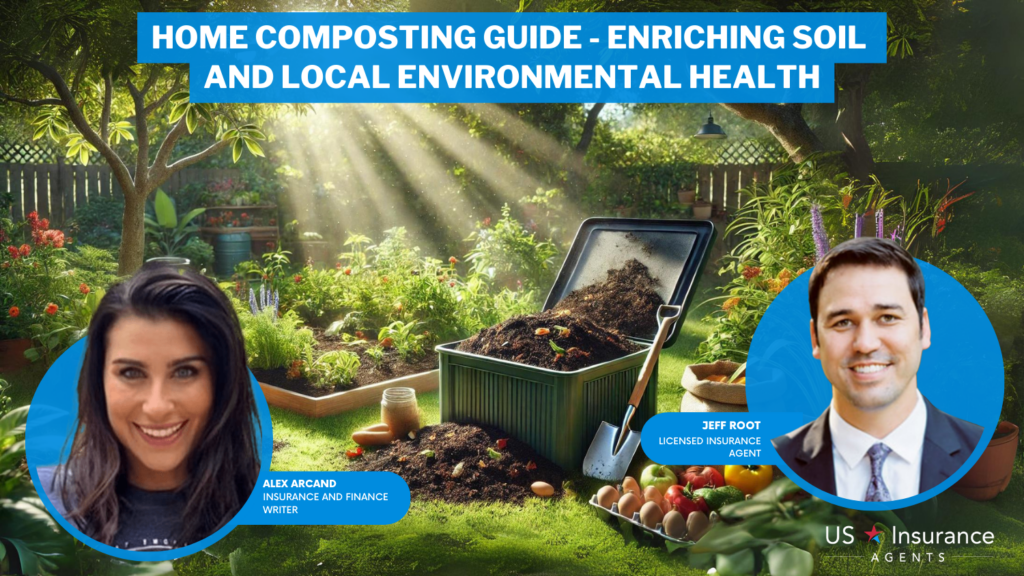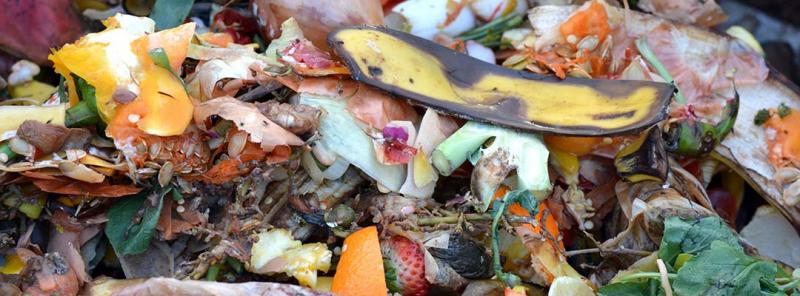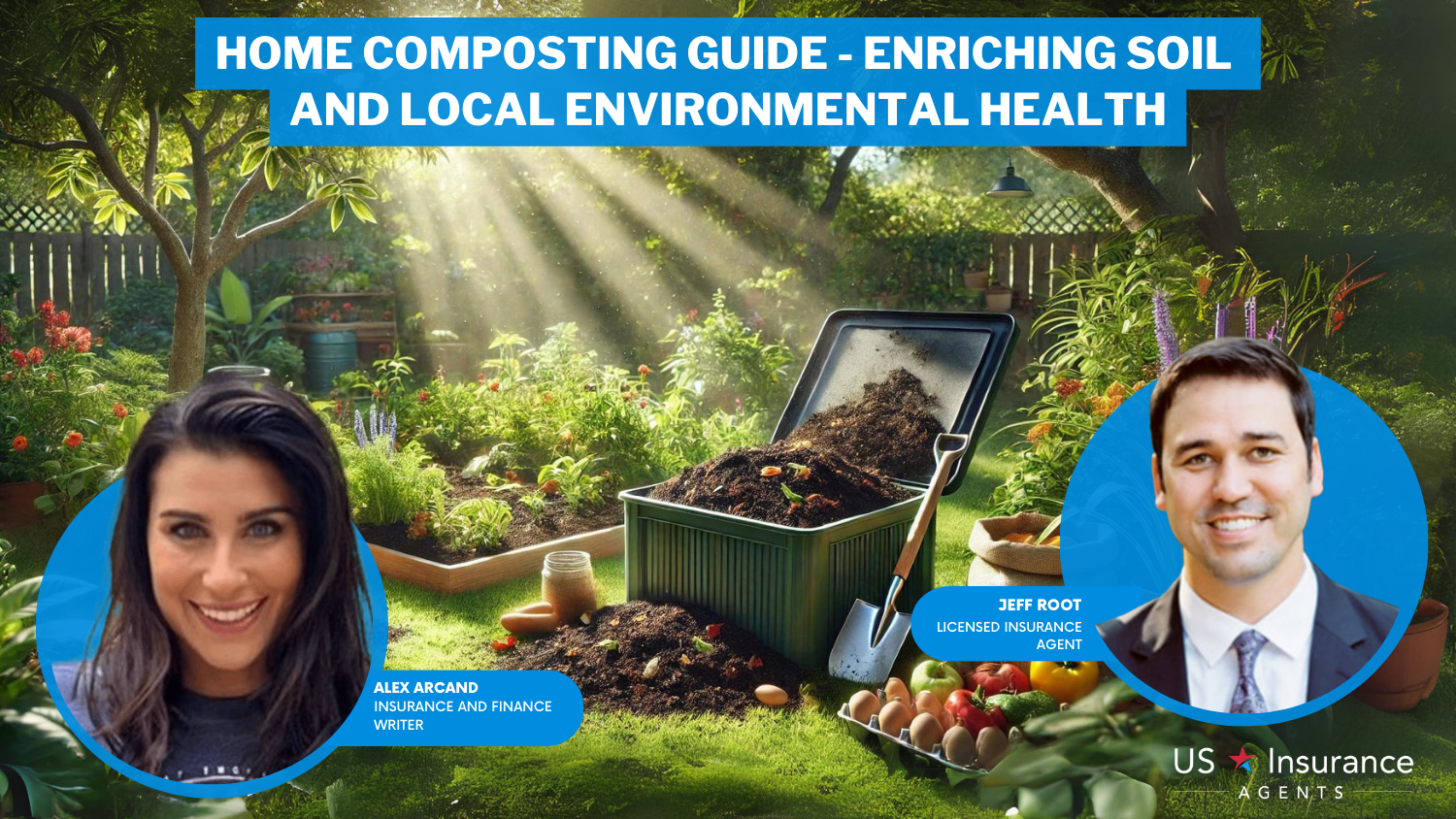Home Composting Guide – Enriching Soil and Local Environmental Health
Use our home compositing guide to learn how composting works, what items to compost, and other composting tips. Composting breaks down organic materials aerobically by using bacteria, microorganisms, bugs, worms, or fungus combined with oxygen. The benefits of composting are it creates less waste in our landfills, less water loss in the ground, and the production of beautiful gardens. Learn more about home composting below.
Read more Secured with SHA-256 Encryption





Table of Contents
Table of Contents


Insurance and Finance Writer
Alexandra Arcand is an outreach administrator and insurance expert located in North Central Ohio. She has a passion for writing, investing, and education. As an insurance content writer for over three years, Alexandra has first-hand experience in business finance, economics, and real estate. She leads an outreach writing team that specializes in travel, real estate, healthcare, law, finance, an...
Alexandra Arcand


Sr. Director of Content
Sara Routhier, Senior Director of Content, has professional experience as an educator, SEO specialist, and content marketer. She has over 10 years of experience in the insurance industry. As a researcher, data nerd, writer, and editor, she strives to curate educational, enlightening articles that provide you with the must-know facts and best-kept secrets within the overwhelming world of insurance....
Sara Routhier


Licensed Insurance Agent
Jeff is a well-known speaker and expert in life insurance and financial planning. He has spoken at top insurance conferences around the U.S., including the InsuranceNewsNet Super Conference, the 8% Nation Insurance Wealth Conference, and the Digital Life Insurance Agent Mastermind. He has been featured and quoted in Nerdwallet, Bloomberg, Forbes, U.S. News & Money, USA Today, and other leading...
Jeff Root
Updated October 2024
Welcome to the comprehensive Home Composting Guide – Enriching Soil and Local Environmental Health, where we delve into the essential topics surrounding composting and its impact on the environment.

In this article, we explore the benefits of composting, the various methods and techniques for successful home composting, and how it contributes to enriching soil quality and promoting local environmental health.
From understanding the composting process to learning about the right ingredients and maintaining a compost pile, we cover everything you need to know to start your own composting journey. Ready to make a positive impact? Enter your zip code below to compare rates from the best insurance providers and take the first step towards a greener lifestyle.

More people are composting today, both for the environment and their own benefit. However, even if the neighbors are doing it, starting out with composting can still seem daunting at first. How do we turn leftovers into nutrient rich soil? What method is the best for a particular situation? What should and should not be composted? The answers are simpler than you may think. In fact, nature will do 99% of the job for you. It just needs a nudge in the right direction.
In this guide, we are going to discuss the benefits and science of composting and guide you step-by-step through the process.
Benefits of Composting
We all know that composting is good for the environment, but what exactly are the benefits?
- Composting means less waste! More composting will result in lower garbage bills, either through less garbage cans needed, a reduction of the strain on municipal waste collection, or by less trips to the landfill.
- Composting means less water loss! Using compost can help to retain moisture in the ground resulting in less water being needed to maintain your garden and lawn.
- Composting helps the environment! More composting means that there will be less waste ending up in landfills.
- Composting can give you a beautiful garden! Compost is high in nutrients and can turn a barely flourishing garden and lawn into something to be envied.
Additional resources:
- Washington State University Compost Fundamentals
- US Composting Council USCC Factsheet: Compost and Its Benefits
- Santa Barbara County Composting: The Benefits
- Seattle Public Utilities Composting Benefits
- City of Euless Benefits of Backyard Composting
Free Home Insurance Comparison
Compare Quotes From Top Companies and Save
Secured with SHA-256 Encryption
How Composting Works
Composting breaks down organic materials aerobically by using bacteria, microorganisms, bugs, worms, or fungus in combination with oxygen. Microbes start the process and begin to increase the temperature of the compost pile. The heat that is generated attracts more microorganisms, larger organisms (insects!), and encourages their growth. The larger organisms eat the waste and create waste of their own; however, what they create after digestion is no longer food matter – it is compost! All of this accelerates the process and results in valuable compost that can be used as fertilizer.
Additional resources:
- New York State Department of Environmental Conservation Everything You Have Always Wanted To Know About Home Composting (PDF)
- Environmental Protection Agency Types of Composting and Understanding the Process
- National Geographic Green Guide to Compost
- University of Illinois Extension The Science of Composting
What to Compost
It is important to know what to compost in order to have a healthy and thriving compost pile rather than a problematic pile of waste!
Add to the compost:
- Coffee grounds
- Egg shells
- Grass cuttings
- Garden waste and leaves
- Vegetable peels and scraps
- Fruit leftovers
- Flowers
- Seaweed
- Hair
- Dryer lint
- Nut shells
- Tea
- Paper or cardboard in small amounts
- Manure
- Leather cut into small pieces
- Ashes from wood burning
Do not compost:
- Milk products
- Bird, dog or cat waste
- Colored paper
- Lime
- Meat
- Oils
- General waste
- Anything toxic
Additional resources:
- Get Composting Composting Guide
- Massachusetts Energy and Environmental Affairs Home Composting Tips: A Guide to Composting Yard & Food Waste
- Organics for All Composting Guide
- Colorado State University Extension Making Compost
- Texas A&M University Home Composting
- University of Arkansas Division of Agriculture Compost and Composting Resources
How to Compost
Are you ready to start?
- Create or purchase a large composting container. You can also make a compost pile directly on the ground, but that will not discourage rodents and other pests.
- Fill your container. You will need a balance of:
- “Green” stuff for nitrogen: grass cuttings, coffee grounds and vegetable scraps are a good start
- “Brown” stuff for carbon: dead plants, autumn leaves and sawdust
- Water: the compost pile should feel moist but not saturated
- Starter compost or soil: this can help to get a new compost pile off to the right start
- Layer or mix the items in your compost so that they are more evenly distributed.
- Turn the compost pile every week or two to allow air into it.
- Harvest your new fertilizer!
Additional resources:
- CalRecycle Backyard Composting
- City of Rockville Backyard Composting
- US Department of Agriculture Composting in Your Backyard
- University of Minnesota Extension Composting and Mulching: A Guide to Managing Organic Yard Wastes
- Michigan Tech How to Compost
Free Home Insurance Comparison
Compare Quotes From Top Companies and Save
Secured with SHA-256 Encryption
Composting Methods
Do you want to go a step further? There are several different composting methods to try at home and all of them have a great result.
Type of composting:
- Vermicomposting: This type of composting starts by adding red worms to your compost pile. The worms eat the organic materials and speed up the process while providing excellent fertilizer. To learn more about vermicomposting you can visit UC San Diego’s Easy Worm Composting at Home.
- Simple wood or wire bin: This is great if the majority of your compost is from yard care. It can be as large as you would like to make it and takes only a short time to assemble. To learn more, visit UC Washington State University’s Home Composting Bins.
- Pre-made composting bins: These are excellent if you are just getting started. The majority of the containers are very compact, won’t take up too much room, and help simplify the process as well by providing drainage and easy access. To learn more, read the Mother Earth News article Choose the Best Compost Bin.
- Layered composting: If you have a garden but don’t have much space for compost, you can begin by composting in layers right in your garden. Bonus: you won’t have to relocate the fertilizer when it is ready! To read more about it, visit University of California Marin’s Gardening Tips: Lasagna Compost.
Additional resources:
- Fine Gardening 6 Ways to Make Great Compost
- University of Florida Composting Methods
- UC Santa Barbara Associated Students Home Composting
- Oregon Metro Composting Methods
Common Mistakes
We all make mistakes when first starting out, but here are some that are easy to avoid:
- Adding animal waste to a compost pile – Don’t do it!
- Letting compost get too wet or too dry
- Not balancing the amount of carbon and nitrogen (green and brown)
- Making the compost too dense – It needs to be able to get some air.
- Locating the compost near your house – Avoid this if you don’t want insects getting inside.
Additional resources:
- Broome County Troubleshooting Compost Piles
- Planet Natural Composting 101: Problems
- Oregon State University ExtensionTroubleshooting Composting Problems
- North Carolina State University Compost Pile Troubleshooting
- Minnesota Pollution Control Agency Diagnosing Common Backyard Composting Problems
Composting Tips
You are already well on your way to creating low-cost fertilizer in your own back yard. Here are some additional things to consider on the way to seeking perfection:
- Cover exposed heaps before heavy rain
- If the pile gets too wet, add dry leaves, newspaper or other organic materials
- Avoid adding weeds unless you are hoping to grow a new patch of them in the compost
- Insulate your compost to promote heat and accelerated decomposition
Finally yet importantly, don’t give up! If you make a mistake, learn from it. Compost is very forgiving and will usually recover from any mistakes that you may have made.
Additional resources:
- Indiana Public Media Composting: 101 Tips and Tricks for Creating a Healthy Heap
- Salt River Pima-Maricopa Indian Community Composting Tips
- San Diego County Composting Tips
- Project Compost Backyard Composting Tutorial
Free Home Insurance Comparison
Compare Quotes From Top Companies and Save
Secured with SHA-256 Encryption
Using Finished Compost
Now that you have dark and rich fertilizer from your compost pile, you are going to need something to do with it. Mix it into soil or use it as mulch by spreading it as a layer over the garden and then let the worms do the work.
Additional resources:
- University of Missouri Extension Making and Using Compost
- Virginia Cooperative Extension Using Compost in Your Landscape
- University of New Hampshire Cooperative Extension Using Your Compost
- Rutgers Cooperative Extension Using Leaf Compost

Frequently Asked Questions
What are the benefits of home composting?
Home composting has several benefits, including reducing waste sent to landfills, improving soil quality, and promoting local environmental health by reducing the need for chemical fertilizers.
What materials can be composted at home?
Organic materials such as food scraps, yard waste, and certain paper products can be composted at home.
What materials should not be composted at home?
Materials that should not be composted at home include meat and dairy products, oils and fats, pet waste, and any materials treated with chemicals or pesticides.
How do I start composting at home?
To start composting at home, you will need a compost bin or pile, organic materials to compost, and a basic understanding of the composting process. Many local governments offer composting resources and education, or you can seek out online resources or attend composting workshops.
What are the different types of composting methods?
There are several different methods of composting, including traditional composting, vermicomposting (composting with worms), and hot composting.
Are there any safety considerations when composting at home?
Composting at home is generally safe, but it is important to properly maintain the compost pile or bin to avoid odors or pest problems. It is also important to follow safety guidelines when handling organic materials and compost.
Get a FREE Quote in Minutes
Insurance rates change constantly — we help you stay ahead by making it easy to compare top options and save.







